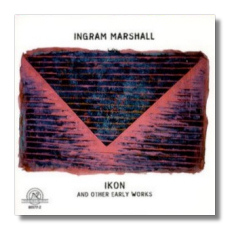
The Internet's Premier Classical Music Source
Related Links
- Latest Reviews
- More Reviews
-
By Composer
-
Collections
DVD & Blu-ray
Books
Concert Reviews
Articles/Interviews
Software
Audio
Search Amazon
Recommended Links
Site News
 CD Review
CD Review
Ingram Marshall

Early Works
- Cortez
- Weather Report
- The Emperor's Birthday
- Rop på fjellet (Cries Upon the Mountains)
- SUNG
- Sibelius in His Radio Corner
- IKON (Ayiasma)
Ingram Marshall, electronics
New World 80577-2 A?D 66:574
Over the past two decades, Ingram Marshall has composed a number of sophisticated works for both electronics and traditional instrumental ensembles; many of these have appeared on the Nonesuch and New Albion labels. No matter what technologies he uses, he clearly is a romantic. His works appeal to the heart, and they stimulate the "old brain" with their landscapes of awe, mystery, and dread. One can feel his intuition at work; his pieces are not based solely on blueprints and dogma.
This CD is a fascinating collection of works from the 1970s. Marshall's influences at the time included his teacher Morton Subotnick, seminal New York minimalist Charlemagne Palestine, Balinese flute music, and Indonesian gamelan music.
This is not music in the traditional sense of the word, but it fully deserves to be described as such. The rhythms, pitches, and timbres of human speech fascinated Marshall, like other composers of the time, and rhythm, pitch, and timbre are part of music as well. In the works on this CD, he dissects and reassembles speech through filtering, looping, alteration of pitch, and other forms of processing. His raw material can be as simple as a male voice saying "aahh," a poet reading a poem, a Danish weather report, or a corny English lesson. In Sibelius in His Radio Corner, Marshall uses an LP of the great Finn's Sixth Symphony as a basis of his fantasy. Rop på fjellet includes the transformed cries of Norwegian sheepherders, and the sound of snow crushing under the composer's skis.
IKON, the work that gives this CD its name, is a wonderful example of the composer's technique. A Swedish poem about a Greek icon is read in the original language by its author. Marshall soon begins transforming it, breaking it down into its most salient elements, and then manipulating these elements for expressive purposes. The word "sönderkysst" (kissed asunder) becomes obsessively present, as does "mörker, o mörker" (darkness, oh darkness), allusions to the icon's destruction by the adoration of generations of penitents. As the piece progresses, Marshall's own voice steals in, reading the poem in English. As it does, the voice of the poet becomes less and less recognizable as human speech. Together, these elements create the impression, half comforting and half disquieting, of gazing into a black infinity of dissolution.
These works are serious, dealing as they do – at least by implication – with death and oblivion. The Emperor's Birthday is a droll exception. In it, a Brooklynesque interviewer questions a Ethiopian man about an odd performance that is going on. (The words "eat glass" are prominent.) The Emperor's Birthday illustrates the statement that the act of studying something alters that which is being studied.
If you like the works of Robert Ashley and Alvin Lucier, this CD should be of great interest to you. Marshall himself produced and engineered it, and there are program notes by Marshall and by Edward Strickland. The 25+-year-old material sounds fine, even on headphones, in these new digital remasterings.
Copyright © 2000, Raymond Tuttle


















